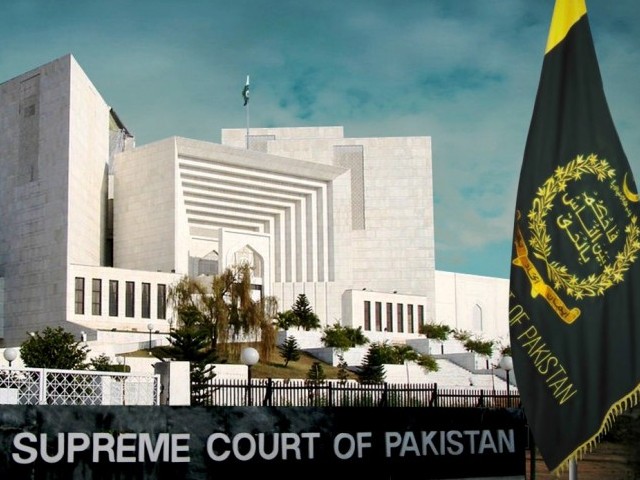SC suspends LHC ruling in Ravi Riverfort Urban Development Project; allows Punjab govt to continue work on the project
ISLAMABAD ( Web News )
The Supreme Court of Pakistan on Monday suspended the ruling of the Lahore High Court (LHC) in the Ravi Riverfort Urban Development Project (RRUDP) case and allowed the Punjab government to continue work on the project.
The bench was hearing appeals against the annulment of the project, earlier declared “unconstitutional” by the Lahore High Court (LHC) on January 25 as the project lacked a master plan.
The court allowed the provincial government to continue construction activity on plots of land for which dues have been cleared. However, the apex court restricted the Punjab government from continuing construction activity on plots for which dues are still pending.
During Monday’s hearing, notices were also issued to the respondents in the case and stated that a review will be done to determine if it constitutes an intra-court appeal. If it is an intra-court appeal, the case will be referred back to the LHC, added the bench.
Earlier in the hearing, the apex court reprimanded the legal team of the Punjab government for appearing before the bench in the case unprepared.
“You do not know what the case is?” asked Justice Ijazul Ahsan when AGP Owais was unable to answer the question. “It seems that you have not prepared.”
The Punjab AGP replied that the provincial government was not a party to the case in the high court’s verdict. “Not being party to one of 18 petitions does not matter,” Justice Ahsan remarked, adding that the Punjab government had presented its position in the high court.
The petitions were against the public hearing of the environment agency, AGP Punjab prayed further.
The justice replied that according to the records, acquisition of lands for the project was also challenged and added that the provincial government’s legal team should not misrepresent in court.
During today’s hearing, Justice Ijazul Hassan inquired about the flaws in the LHC verdict.
However, Punjab Advocate General Ahmed Awais Advocate couldn’t answer the court’s question, only to draw Justice Ijazul Ahsan’s ire.
“You don’t even know what the case is about,” the judge remarked.
Justice Sayyed Muzahir Ali Akbar Naqvi remarked while addressing Punjab AG Awais that it seemed like he had come unprepared for the hearing.
At this, the provincial advocate-general informed the court that the Punjab government was not a party in the case LHC announced the verdict for.
“There were 18 petitions challenging the RRUDP in total. Not being a party in only one petition doesn’t make a difference,” Justice Ijazul Ahsan remarked. He said that the Punjab government had presented its stance in the high court.
“Don’t go into technicalities,” the judge warned the government lawyer, directing him to give a solid argument.
Justice Ijazul Ahsan further stated that the case records suggested that the land acquisition for RRUDP had also been challenged in the petitions, therefore, the government’s lawyers should refrain from making false statements before the court.
Meanwhile, the counsel representing Ravi Urban Development Authority (RUDA) maintained that the housing societies were the petitioners in LHC.
At this, Justice Naqvi remarked that it was because the conflict housing societies’ interest was evident here.
The government’s lawyers managed to move the court to rule out the LHC’s verdict.
After hearing the arguments, the SC nullified the challenged verdict and directed the government to continue work on the RRUDP.
‘Work can be resumed only on lands that have been paid for’
Moreover, the court issued notices to the parties, making it clear that the work can be carried on only on the sites whose owners have been paid for their land.
The court stated that it will figure out if inter-court appeals against the LHC verdict are maintainable or not.
“The case will be forwarded to LHC if the appeals are maintainable,” the apex court remarked.
It gave the observation that the LHC referred to the US laws but there is a difference in situations in the US and Pakistan.
It is worth mentioning here that on last Tuesday, LHC Justice Shahid Karim had declared the RRUDP illegal while announcing a verdict on the petitions challenging the mode and manner of the land acquisition proceedings undertaken by the RUDA.
The court directed the Authority to return the money it had acquired from the government within two months.
The court had also noted that proper procedure was not adopted in purchasing agricultural land for the Ravi Urban Development project in Lahore and Sheikhupura, therefore, it declared the practice of acquiring the land through amendment in Section 4 of the RUDA Ordinance “unconstitutional”.
“Section 4 of the RUDA (amendment) Ordinance 2021 is contrary to Article 144 of the Constitution,” the order said. “The acquirement notification of Section 4 is illegal.”
However, on January 28, Prime Minister Imran Khan had said the government would now invoke the jurisdiction of the Supreme Court in the case.
“The case would be presented in a better manner to bring to the court’s attention the scheme’s significance in view of urban development and civic facilities,” the premier had said.
PM Imran had highlighted the salient features of the project, including plantation of twenty million trees as part of forestation, construction of barrages to shore up the water table and filtration of sewerage.
Giving grounds for the ambitious $Rs20bn project, the premier had explained that the riverfront project would yield employment opportunities and encourage foreign investment, adding that an amount of Rs1.5 billion had been already received in this regard.

